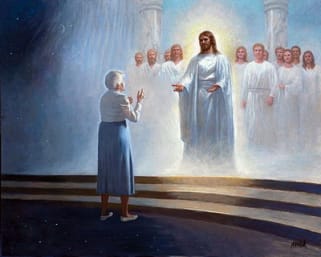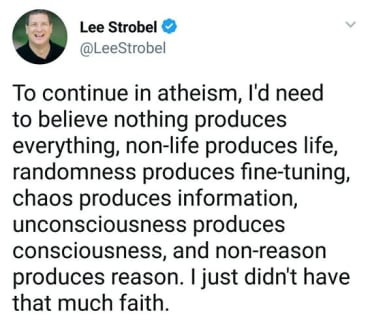Is there Life after Death?
Have you thought about death? Or what comes after it? Psychiatrists report that 75% of their patients are disturbed at the prospect of their death. The amazing thing is:
-few people ever investigate death
-few make an attempt to understand death
-few ever talk about death
Being that death is certain, wouldn’t you want to learn all you could about it? If there is an afterlife, wouldn’t you want to know about it also? Virtually all religions talk about death and most speak about an afterlife. You make extensive plans about where you’ll spend your vacation for 2 weeks. Doesn’t it make sense to make plans for where you’ll spend eternity?
To understand death, we need to understand life. The problem is that death, life and the afterlife cannot be measured. Nor can we create life, although we can somewhat perpetuate it. Life involves doing things we can observe ( other people, our immediate surroundings, etc.) and things we cannot observe ( thoughts, emotions, love, etc.). Death is the absence of our physical life.
Materialists believe that when you physically die, your soul/spirit dies also. So when you die, your body goes into the ground (in a coffin) while your spirit just ceases to exist. Every cell in our body is replaced every 7 years or so. But if life were just matter and energy, our body would be replaced every 7 years. Memory would be lost and our personality would change, We wouldn’t be the same people. Yet, we know this isn’t what happens. We retain our memories and personality. So, our life must be more than just matter, energy and chemical reactions in our brains and bodies.

Almost all religions believe in an afterlife. Many of the archaeological finds from every culture tell us this. Even when someone’s physical body is damaged beyond recognition, that person is still the same person mentally. About all we can say is that the brain is a conduit that the soul/spirit operates through. So our body is different from our soul/spirit. At death, our body dies (no brain waves, no heartbeat, etc.) and goes to the grave. But where does our spirit go?
Some people have had what we call Near Death Experiences (NDE’s), where they and their doctors claim that they have died but came back to life. Some scientists have tried to explain NDE’s in terms of our physical reactions of our senses, our nerves or physical reactions in our brains. But these have never been proven and are largely ignored now. While some of these NDE people have described events that they couldn’t have known about, almost all of the NDE stories taken together are very consistent. The experience of an NDE is almost universal, but how people interpret that experience is where the difference comes in. Some go to heaven, a few go to hell, some see Jesus, some just see a Being of Light. NDE’s all speak of an afterlife. Because we can’t observe, measure and repeat these experiences, it doesn’t seem possible that we’ll ever be able to scientifically prove anything about the afterlife or an NDE. But that doesn’t mean that we cannot know anything about an afterlife.
There are enough things that almost all NDE’s have in common to make it not just a coincidence. John Burke’s book, “Imagine Heaven” is a great book on this subject.

The most compelling evidence for an afterlife comes from the bible. Given that the bible is so accurate in many other fields (see “Prove to Me that God Exists” at http://BSSSB-LLC.com/video-courses-overview/prove-to-me-that-god-exists/ and “How We Got the Bible” at http://BSSSB-LLC.com/video-courses-overview/how-we-got-the-bible/), we have every reason to believe it over any other religious books.
The bible distinguishes the body from the spirit in many places.
– Stephen gave up his spirit when he died (Acts 7:29)
– Jesus did the same in Matthew 27:50
– Paul said to be away from the body was to be at home with the Lord (2nd Corinthians 5:8)
The Sequence of Events after Death:
1…our body dies and is buried or cremated
2…our spirit immediately goes to…
A…be with Jesus in the intermediate heaven if we know Him
B…be in Hades, the place of the dead, if we don’t know Jesus
3…Jesus returns to Earth and judgement begins (Revelation 20:11-15). There are many other events that occur before this happens but we won’t go into those here.
4…people’s spirits are reunited with their bodies.
5…some will spend eternity in the future heaven with God.
6…some will spend eternity separated from God forever in hell.
For 5& 6, read Daniel 12:2 and Matthew 25:41-46.
For a more detailed view of heaven and hell, watch or read “Heaven and Hell” at http://BSSSB-LLC.com/video-courses-overview/heaven-and-hell/.

The one person who did die and came back to life is Jesus. He even said that His resurrection would prove that everything He told us while on Earth is true (John 2:19-22 & Luke 24:44-46). What He told is recorded in the bible. So He not only predicted His own death, He predicted His own resurrection. How many people do you know that have successfully done that? This is a man to be listened to!
Maybe it’s time for you to talk or think about death and the afterlife…about where you’ll spend it…and what is required to spend it with God in eternal happiness.
Jesus said “Come to me all you who are weary and burdened and I will give you rest” (Matthew 11:28).
God has a wonderful plan for your life (Jeremiah 29:11)
But you are sinful, you’re not perfect (Romans 6:23)
Jesus died for your imperfections, for your sins (Romans 5:8)
Accept Him as your Savior…Invite Him into your life (John 1:14)
If you have any questions, please write to me.
Book reference:
“Heaven” by Randy Alcorn
“Imagine Heaven” by John Burke
For His Kingdom,
Dave Maynard
http://BSSSB-LLC.com




